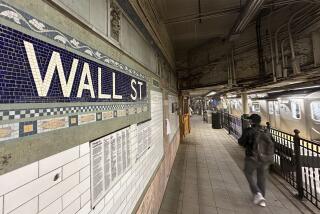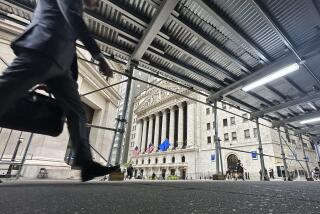Stocks sink on payroll picture
Stocks and bonds ended the first week of 2007 with sharp losses Friday after a surprising surge in jobs and wages diminished investors’ hopes for an interest rate cut.
Bond yields rose sharply after the Labor Department said U.S. employers increased their payrolls by 167,000 people in December and boosted workers’ hourly wages by 0.5%. The unemployment rate held steady at 4.5%.
The report suggests that the economy won’t be slowing as much as investors anticipated. That should prove positive for stocks in the long run, but the report raised concerns Friday that the Federal Reserve might use it as a reason to raise interest rates. A rise in rates could crimp consumer spending and further weaken the housing market by making mortgages pricier.
At this point, though, economists expect policymakers to keep rates steady.
“Until we get an uptick in the unemployment rate, in this environment the Fed will probably stay in a holding pattern,” said Commonfund chief economist Michael Strauss, pointing to the slowing but still expanding economy. “Moderate economic growth is historically good for the equity market, not a bad thing.”
Concerns about the job report added to disappointment over a profit warning by Motorola and a series of analyst downgrades of technology companies’ stocks.
The Dow Jones industrial average fell 82.68 points, or 0.7%, to 12,398.01 -- the biggest one-day drop since Nov. 27. The Dow had been down more than 115 points during the session Friday.
Broader stock indexes also fell. The Standard & Poor’s 500 index slipped 8.63 points, or 0.6%, to 1,409.71, and the technology-focused Nasdaq composite index dropped 19.18 points, or 0.8%, to 2,434.25.
The yield on the 10-year U.S. Treasury note shot up to 4.65%, from 4.6% Thursday. Yields on bonds and their prices move in opposite directions.
Friday’s steep declines capped a week that showed the stock market’s indecision over whether it wants the economy to slow down or perk up. On Wednesday, the first trading day of 2007, stocks fell after the Fed released minutes expressing concern that the weak housing sector might be a drag on the economy. However, Friday’s job data, suggesting a quickening economy, also caused stocks to drop.
The clash between worries over economic cooling and inflation is due largely to investors’ caution, given stocks’ big run-up in late 2006.
“It’s just a sign of volatility,” said Jeff Kleintop, chief investment strategist for PNC Wealth Management. “We just went through a rally that could’ve been drawn with a ruler.”
For the week -- and the new year -- the Dow is down 0.5%, the S&P; is down 0.6% and the Nasdaq is up 0.8%.
The Federal Reserve, which has kept short-term rates stable since August after raising them steadily for two years, is expected to leave them on hold again when it meets Jan. 30 and 31.
Still, investors were nervous enough Friday to sell stocks and bonds, adhering to a months-long pattern of cashing in gains at the first possible sign of a rate hike -- which the Fed would enact if inflation accelerated.
“There are worries about inflation on signs of increasing wages, but you have to take that with a grain of salt,” Kleintop said. He noted that other wage measures, such as the employment cost index, have remained fairly tame. Also, energy prices have declined sharply.
Crude oil futures rebounded 72 cents Friday to settle at $56.31 a barrel on the New York Mercantile Exchange but ended nearly 8% lower for the week amid expectations of sluggish demand because of mild weather in the Northeast and elsewhere.
The dollar rose against most major currencies, with the euro falling to $1.301 from $1.309. Gold futures plunged $19 an ounce to $604.90.
In other market highlights:
* Motorola fell $1.61 to $18.94 after the world’s second-largest cellphone maker slashed estimates of its sales and earnings for the just-ended fourth quarter.
Other technology stocks also fell after a spate of analyst downgrades. Intel declined 7 cents to $21.10, Silicon Laboratories sank $1.98 to $33.36 and Irvine’s Broadcom slid $1.07 to $32.50.
* Strong December sales figures from electronics retailers Best Buy and Circuit City met different market reactions.
Best Buy rose 16 cents to $50. Circuit City, however, fell 71 cents to $19.29 amid worries about competition from Best Buy.
More to Read
Inside the business of entertainment
The Wide Shot brings you news, analysis and insights on everything from streaming wars to production — and what it all means for the future.
You may occasionally receive promotional content from the Los Angeles Times.










